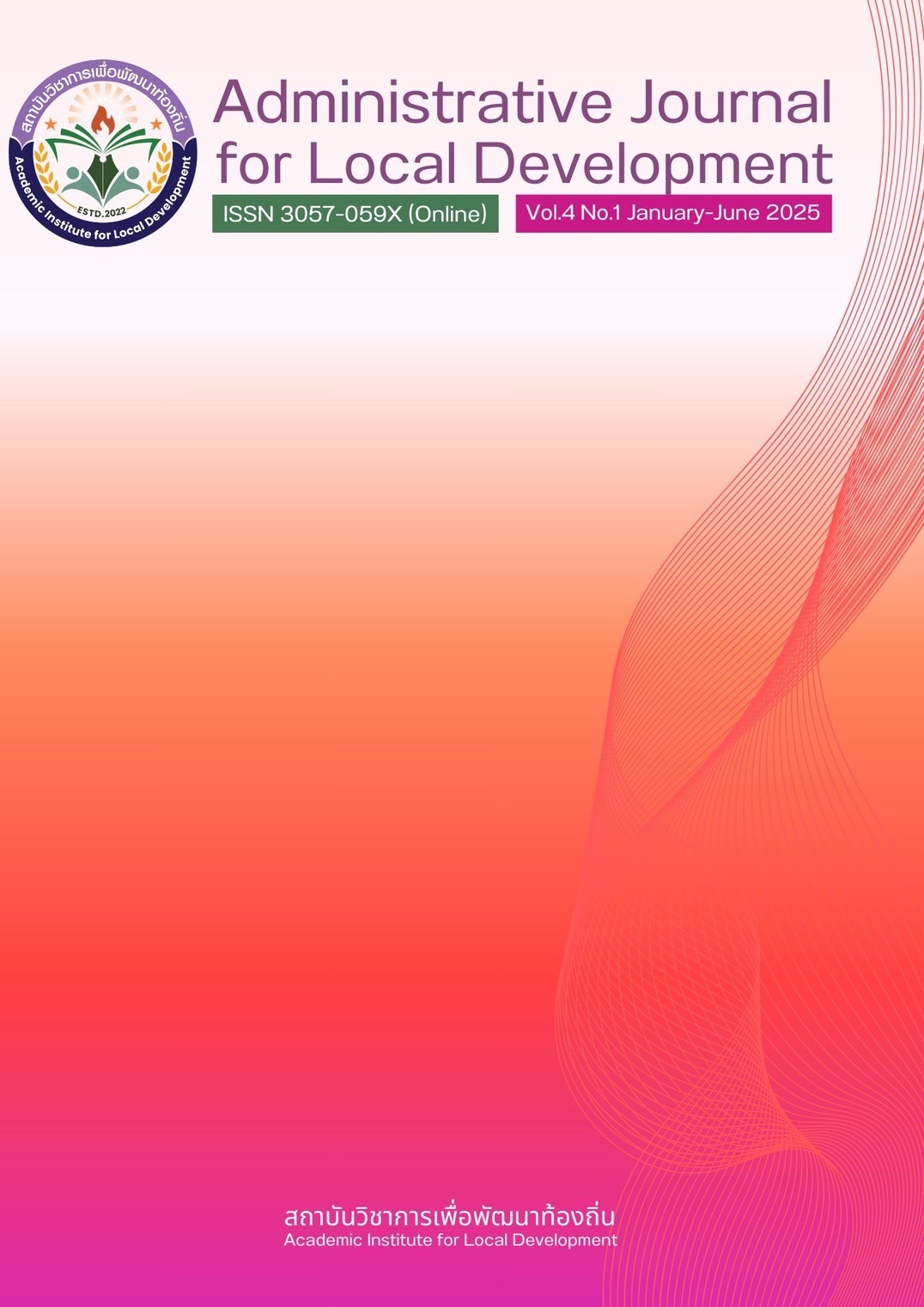Competencies of Educational Leaders for Sustainable Development (ESD)
DOI:
https://doi.org/10.14456/ajfld.2025.9Keywords:
Educational leadership competencies, Education for Sustainable Development, SustainabilityAbstract
This article examines the competencies of educational leaders in the context of Education for Sustainable Development (ESD) through an in-depth review of international literature, research conducted in Thailand, and case studies of schools and organizations that have successfully implemented ESD initiatives. The study identifies five core competencies essential for educational leaders in driving sustainable development: strategic problem-solving, emotional intelligence, innovation, teamwork, and adaptability to change. Furthermore, it presents a three-dimensional framework for developing these competencies, emphasizing training and skill development, the integration of technology to support learning, and experiential learning. These strategies can be effectively applied within educational institutions and communities to promote long-term sustainability. The findings underscore that strengthening the competencies of educational leaders in the ESD framework not only enhances the efficiency of educational management but also fosters positive societal and community transformations. The proposed leadership development strategies play a crucial role in advancing sustainable development goals (SDGs) and shaping a more sustainable future for all.
Downloads
References
อาภาพร รอดโตนด. (2564). ความคิดเห็นของผู้พักอาศัยต่อการให้บริการนิติบุคคลอาคารชุดบริษัท พฤกษา เรียลเอสเตท จำกัด (มหาชน) [วิทยานิพนธ์ปริญญามหาบัณฑิต ไม่ได้ตีพิมพ์]. มหาวิทยาลัยรามคำแหง
กนกอร สมปราชญ์. (2562). ภาวะผู้นำกับคุณภาพสถานศึกษา [วิทยานิพนธ์ปริญญามหาบัณฑิต ไม่ได้ตีพิมพ์]. มหาวิทยาลัยขอนแก่น
จิรพล สังข์โพธิ์, และคณะ. (2560). ภาวะผู้นำในการบริหารองค์กรยุคดิจิทัล [วิทยานิพนธ์ปริญญามหาบัณฑิต ไม่ได้ตีพิมพ์]. มหาวิทยาลัยธรรมศาสตร์.
ณัฐกุล ชอบใจ, และพรสุดา ประมายะยัง. (2567). ภาวะผู้นำทางการศึกษายุคการพลิกผันของดิจิทัลกับการพัฒนาที่ยั่งยืน. วารสารราชภัฏสุรินทร์วิชาการ, 2(1), 89-104.
ธีระ รุญเจริญ. (2555). ความเป็นมืออาชีพในการจัดและบริหารการศึกษายุคปฏิรูปการศึกษา. กรุงเทพฯ: บริษัท แอล.ที.เพรส จํากัด.
สุกัญญา แช่มช้อย. (2565). การบริหารสถานศึกษาเพื่อสร้างนวัตกรรุ่นเยาว์. กรุงเทพฯ: สำนักพิมพ์จุฬาลงกรณ์มหาวิทยาลัย.
Chobjai, N., & Pramayayang, P. (2024). Leadership in Educational Disruption Era and Sustainable Development. Surindra Rajabhat Journal of Academics, 2(1), 89-104.
Goleman, D. (1995). Emotional Intelligence: Why It Can Matter More Than IQ. New York: Bantam Books.
Hargreaves, A., & Fink, D. (2020). Sustainable Leadership. San Francisco: Jossey-Bass.
Heifetz, R., & Linsky, M. (2002). Leadership on the Line: Staying Alive through the Dangers of Leading. Boston: Harvard Business Review Press.
Hopkins, C. (2013). Education for sustainable development: Challenges, strategies, and practices. UNESCO.
Kanokorn, S. (2019). Integrating Environmental Conservation into Local Schools. Bangkok: Chulalongkorn University Press.
Katzenbach, J. R., & Smith, D. K. (1993). The Wisdom of Teams: Creating the High-Performance Organization. Boston: Harvard Business School Press.
Mezirow, J. (2000). Learning as transformation: Critical perspectives on a theory in progress. Jossey-Bass.
Robinson, K. (2011). Out of Our Minds: Learning to be Creative. West Sussex: Capstone Publishing.
Schwab, K. (2016). The Fourth Industrial Revolution. Crown Business.
Senge, P. M. (2006). The Fifth Discipline: The Art and Practice of the Learning Organization. New York: Doubleday.
Sterling, S. (2001). Sustainable education: Re-visioning learning and change. Green Books.
Tilbury, D. (2021). Leading Education for Sustainability in Higher Education. Sydney: Macquarie University.
UNESCO. (2017). Education for sustainable development goals: Learning objectives. UNESCO.
UNESCO. (2020). Education for Sustainable Development: A Roadmap. Paris: UNESCO Publishing.
UNESCO. (2021). Learning to Build Back Better Futures for Education. Paris: UNESCO Publishing.
Wenger, E. (1998). Communities of practice: Learning, meaning, and identity. Cambridge University Press.
Downloads
Published
How to Cite
Issue
Section
Categories
License
Copyright (c) 2025 Administrative Journal for Local Development

This work is licensed under a Creative Commons Attribution-NonCommercial-NoDerivatives 4.0 International License.










